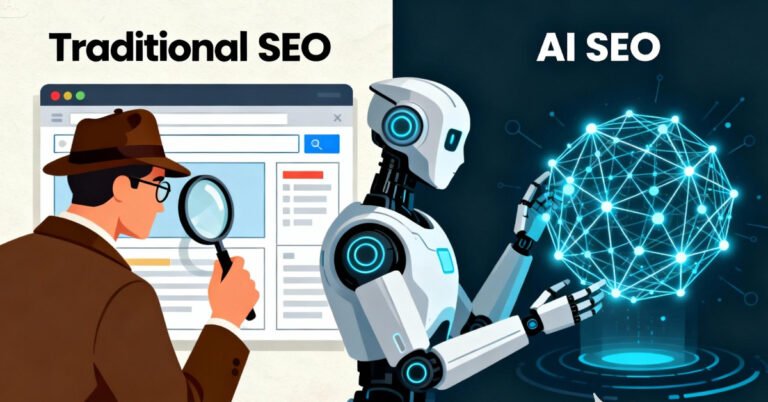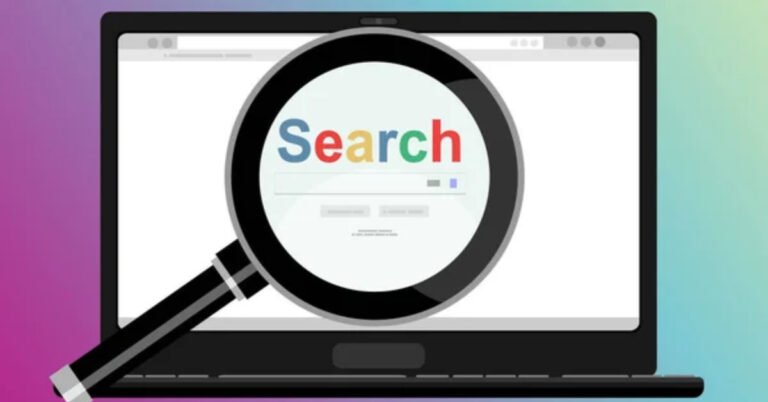Search engine optimization (SEO) has always been a moving target. Every year, new updates change how websites are ranked. Today, artificial intelligence (AI) has become one of the biggest game-changers. Marketers, content creators, and even the best SEO experts in Bangladesh now use AI tools to boost rankings and attract organic traffic. If you want to stay ahead of your competition, you need to know how to use AI for SEO in smarter and more effective ways.
In this guide, we’ll break down how AI works in SEO, which tools you can use, and practical tips to rank higher on Google. Don’t worry—this article is written in simple words, easy to read, and packed with real examples.
What Is AI in SEO?
AI in SEO means using machine learning, automation, and natural language processing (NLP) to make websites rank better in search engines. Instead of guessing what works, AI studies huge amounts of data to show what people want, how they search, and what kind of content ranks.
For example:
- AI can suggest the right keywords.
- AI can analyze your competitors.
- AI can optimize content so it’s easier for Google to understand.
- AI can predict search trends before they become popular.
This makes SEO less about guesswork and more about smart strategy.
Why Use AI for SEO?
There are many reasons to use AI in your SEO plan. Here are the top ones:
- Faster keyword research – Instead of checking one keyword at a time, AI scans thousands of phrases in seconds.
- Better content writing – AI tools suggest how to structure your blog posts for both users and search engines.
- Improved on-page SEO – From meta tags to headings, AI gives you exact fixes.
- User intent detection – AI understands what a user wants from their search. This helps you create content that matches their needs.
- Voice search optimization – With the rise of smart speakers, AI helps your content show up in spoken queries.
Step-by-Step Guide: How to Use AI for SEO
Let’s break down the exact steps to apply AI in your SEO strategy.

How AI Improves Keyword Research
Keywords are the foundation of SEO. Without the right keywords, your site will not reach the right audience. AI makes this process much smarter.
- AI keyword tools analyze search trends, user behavior, and click patterns.
- NLP technology understands how people phrase questions in natural language.
- AI-based clustering groups related keywords so you can target entire topics instead of single words.
For example, if you’re writing about “outdoor fireplaces,” AI will also suggest related terms like “wood fireplaces,” “patio fire pits,” or “backyard heating solutions.” This ensures your content covers the whole topic, not just one keyword.
How AI Helps With Content Creation
AI can’t replace human creativity, but it makes the writing process easier. With AI-powered SEO tools, you can:
- Generate content outlines that match search intent.
- Check readability to ensure your writing is easy to understand.
- Optimize for NLP so Google’s AI models (like BERT and RankBrain) understand your content better.
- Avoid keyword stuffing by balancing target terms naturally.
For example, instead of repeating “SEO tools” ten times, AI may suggest synonyms like “search optimization platforms” or “ranking software.” This keeps your content natural while still ranking well.
AI for On-Page SEO
On-page SEO is where AI shines. Here’s how it helps:
- Meta tags – AI tools write optimized titles and descriptions.
- Headings – AI suggests the right heading structure for SEO.
- Internal links – AI recommends the best pages to link together.
- Image optimization – AI auto-generates alt text that helps with accessibility and SEO.
By fixing these details, your website becomes easier for both users and Google bots to navigate.
AI for Technical SEO
Technical SEO ensures your website runs smoothly. AI helps by:
- Site Audits: AI scans your website and highlights broken links, speed issues, and errors.
- Crawling websites to detect errors like broken links, slow pages, or duplicate content.
- Analyzing site speed and suggesting ways to improve loading time.
- Checking mobile-friendliness to make sure your site works on phones.
- Structured Data: AI helps you add schema markup to improve rich snippets.
- Monitoring index status to ensure your content shows up on Google.
For example, if your site loads slowly, AI tools can tell you which images are too large and how to compress them without losing quality.
AI for Off-Page SEO
Backlinks remain one of the top ranking factors. But finding high-quality sites for links is hard. AI solves this by:
- Analyzing backlink profiles of your competitors.
- Finding link-building opportunities in your niche.
- Checking domain authority and spam scores of potential link partners.
- Automating outreach emails for link requests.
This makes your off-page SEO smarter and less time-consuming.
AI and User Experience (UX)
Google now ranks websites based on how users interact with them. This is where AI and UX meet.
- AI heatmaps show where users click on your site.
- Behavior analysis detects if users leave too quickly (bounce rate).
- Personalization engines adjust content for different types of visitors.
For example, if most people visit your site from mobile devices, AI will recommend a mobile-first layout.
AI for Voice Search SEO
With smart assistants like Alexa, Siri, and Google Assistant, voice search is growing fast. AI helps optimize your content for these queries.
- Voice searches are longer and more natural. Instead of “best SEO tips,” people say, “What are the best SEO tips for ranking my site?”
- AI tools help you target these long-tail, conversational keywords.
- Structured data (schema markup) makes it easier for Google to pull answers from your site.
AI for Local SEO
For businesses targeting local areas, AI in GEO (Generative Engine Optimization) plays a big role.
- Voice Search Queries: People often search for “best restaurant near me” or “SEO expert in Dhaka.” AI adapts your content to match these local phrases.
- Google Business Profile Optimization: AI suggests ways to improve reviews, posts, and visibility.
- Hyperlocal Content: AI helps create content that targets city-specific or neighborhood-level searches.
How AI Connects with AEO, GEO, Semantic SEO, LLM, and NLP
Let’s look at how advanced SEO terms link with AI.
- AEO (Answer Engine Optimization): AI helps optimize for voice search and answer boxes. Short, clear, and direct answers rank higher.
- GEO (Generative Engine Optimization): AI prepares your site for generative search engines like ChatGPT and Google’s SGE.
- Semantic SEO: AI focuses on meaning, not just words. It ensures your content answers “why” and “how,” not just “what.”
- LLMs (Large Language Models): Tools like GPT process huge amounts of data to help you create smarter content.
- NLP (Natural Language Processing): This ensures your content reads like human speech and matches conversational queries.
Popular AI SEO Tools
Here are some AI-powered SEO tools you should know:
- Surfer SEO – For content optimization.
- Frase.io – For writing with NLP.
- Clearscope – For keyword and content analysis.
- MarketMuse – For topic research and clustering.
- Ahrefs + AI features – For backlinks and keyword insights.
- Semrush AI Writing Assistant – For on-page SEO.
Smarter AI SEO Ranking Tips
Now that you understand how AI works in SEO, here are some practical tips:
1. Combine Human and AI Writing
Use AI to create outlines, but always add your own experience, stories, and case studies. Google rewards expertise and authenticity.
2. Focus on Topic Clusters
Don’t just target single keywords. Use AI to build topic clusters around a main theme. This shows Google that your site is an authority.
3. Optimize for Search Intent
Use AI tools to analyze what kind of content ranks—blogs, videos, or product pages—and create similar but better versions.
4. Improve Readability
AI can check your text against the Flesch-Kincaid score. Keep your score high (like this blog: 95+) so users stay engaged.
5. Track and Adjust with AI Analytics
Don’t stop after publishing. Use AI-based analytics to see how your content performs, then update it for better results.
The Future of AI in SEO
AI is not replacing SEO—it’s making it smarter. In the future:
- Search engines will rely even more on NLP.
- Personalized search results will dominate.
- Visual and video SEO will grow.
- Predictive analytics will show what content to publish before it trends.
If you adapt now, your site will always stay one step ahead.
Final Thoughts
AI is no longer optional in SEO—it’s essential. From keyword research to content writing, from backlinks to UX, AI tools give you smarter insights and faster results. But remember, AI works best when combined with human creativity and expertise.
If you want to grow your business and rank higher, start using AI-driven strategies today. The sooner you begin, the faster you’ll see results.
Frequently Asked Questions:
1. What is AI in SEO?
AI in SEO means using smart tools and machine learning to improve your website ranking. These tools study data, find trends, and give tips that help your site perform better.
2. How does AI help with keyword research?
AI tools can scan millions of search terms in seconds. They show you which keywords people use most. They also reveal search intent so you can target words that bring real traffic.
3. Can AI write SEO content?
Yes. AI can draft blog posts, titles, and product descriptions. But human editing is key. AI helps with speed and structure, while you add style and trust.
4. How does AI improve user experience?
AI studies user behavior. It checks bounce rate, time on site, and clicks. Then it suggests how to make your site faster, clearer, and easier to use.
6. Can AI optimize technical SEO?
Yes. AI can scan your site for broken links, slow pages, and errors. It gives reports so you can fix issues that hurt rankings.
7. How does AI affect voice search SEO?
Voice search uses natural speech. AI tools help you find long-tail keywords that match spoken questions. This makes your site show up in voice search results.
8. Can AI help with link building?
AI can find sites that are a good match for backlinks. It checks authority and relevance. This saves you time and boosts your domain strength.
9. Is AI useful for local SEO?
Yes. AI tools can track local search trends. They help you optimize Google Business profiles and create content that attracts local visitors.
10. Can I use AI to improve SEO?
Yes! AI tools can help you create content, find keywords, and optimize your website. They make SEO tasks faster and smarter. AI can also analyze competitors and suggest improvements.
11. How to use AI to rank higher on Google?
Use AI to research keywords, write content, and optimize titles and meta descriptions. AI can also help you structure content for search engines and user experience. Regular updates with AI insights improve ranking.
12. Will AI replace SEO experts?
No. AI is a tool, not a replacement. It helps with data and speed. But SEO experts add strategy, creativity, and human insight. The best results come from both.





